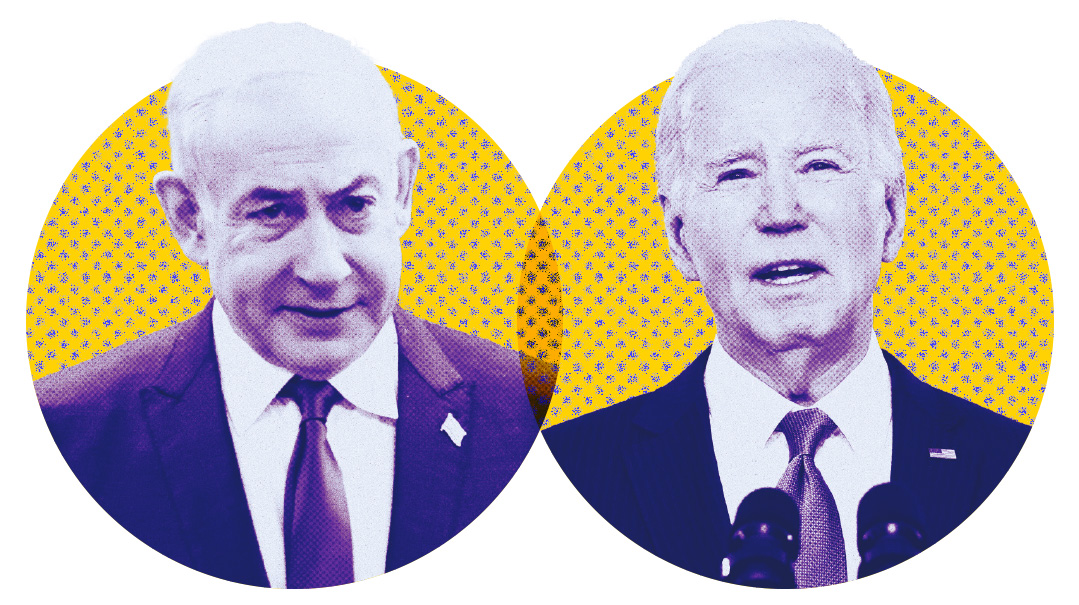Petty Disputes Bog Down US-Israel Ties

There are no assurances that a Republican administration will be that much more favorable to Israel

Photos: AP Images
Liberal-minded Americans overwrought with a portrayal of Israel’s new government as far-right, ultranationalist, with a splash of fascism, can breathe easier.
This latest incarnation of the Netanyahu government, even with Itamar Ben Gvir and Bezalel Smotrich holding senior cabinet positions, was at its deferential best during last week’s visit from Jake Sullivan, President Biden’s national security advisor.
At the government’s urging, a Jerusalem planning board delayed consideration of expansion plans for a Jewish neighborhood in Jerusalem. The Defense Ministry dutifully dismantled a new outpost in Judea named in memory of Rabbi Chaim Druckman, a spiritual leader of the national-religious community. And when a bipartisan US Senate delegation led by Senator Jacky Rosen (D-NV) met several top Knesset members and steered clear of Smotrich and Ben Gvir, no one uttered a peep.
To add insult to injury, just as Sullivan was conveying the Biden administration’s profound fears over Netanyahu’s plans to reform the judiciary, Israel’s High Court bared its teeth, applying their form of cancel culture to Aryeh Deri.
We don’t pretend to know everything said behind closed doors. We don’t know if Netanyahu merely listened politely, or if he diplomatically told Sullivan that Biden ought to be more concerned about the directional tilt of his own Supreme Court than Israel’s, but the Netanyahu government conveys weakness when it bows to an American agenda that runs counter to Israel’s long-term national interests.
Netanyahu has set a goal of avoiding antagonizing the Biden administration, and he made this clear to his coalition partners before they signed on.
Bibi also remembers 2010, when Biden was vice president and landed in Israel only to hear that the Ministry of Housing had just approved 1,600 new homes in the Ramat Shlomo neighborhood of north (not east) Jerusalem. Biden reacted strongly, condemning a decision that he perceived as a political slap in the face.
Rolling Political Dice
Netanyahu’s middle name is caution. On that basis, his strategy is fathomable, but it’s not riskless. And once again, his government missed an opportunity to express reasonable positions and goals in both a forceful and persuasive manner.
The delay in the housing project to appease Sullivan is only temporary. It involves the expansion of Nof Tziyon, a neighborhood in southeast Jerusalem established more than 20 years ago and built on private land purchased legally by supermarket mogul Rami Levy.
Nof Tziyon borders the Arab village of Jebel Mukaber, which is also within Jerusalem’s municipal borders. Like Ramat Shlomo, it is one of the dozens of Jewish neighborhoods that border on and coexist with Arab communities. There is no way Sullivan would visit there, because, like every other member of the international community, he has an allergy to anything Israeli over the Green Line, even if it serves as a living example of two different peoples living together in relative peace.
Netanyahu, who finally came out on top after five elections in three and a half years, is a political animal who hopes that Americans will elect a Republican president in 2024 who would view the Israeli right as comrades, not adversaries.
That’s a gamble.
Biden is getting shredded now over his classified documents scandal, but this could be ancient history by next year. Even if Biden is swept away by it, the Democrats have a wider roster of potential presidential candidates than they did in 2020, when party leaders saw Biden as the only mainstream Democrat capable of denying Donald Trump a second term.
There are also no assurances that a Republican administration will be that much more favorable to Israel, at least on Netanyahu’s terms. Recent polls show support for Israel dropping precipitously among young evangelical Republicans. A 2021 survey commissioned by the University of North Carolina showed support from evangelicals under 30 dropping precipitously from 75% in 2018 to 34% in 2021. A Pew Survey in March 2022 revealed that evangelicals ages 18–29 held a more favorable view of the Palestinians (61%) than Israelis (56%).
Even Trump, considered by many to be the most pro-Israel president ever, warned Bibi — and publicly — to take it slow on settlements. His deal of the century would have confined Israel to just 30 percent of Judea and Samaria, with the rest held in escrow for a future Palestinian state.
Bold Is Better
Patience is not always a virtue.
While the Biden administration seems resigned to the demise of the Iran nuclear deal and the two-state solution, it needs quiet on the Middle Eastern front to pivot to other global trouble spots — mainly China, North Korea, and now, Europe.
Saudi Arabia is one place where both the US and Israel can do business and win some peace.
Just two months ago, JINSA, the Jewish Institute for National Security of America, led a delegation to meet with Saudi leaders in Riyadh. JINSA Senior Fellow John Hannah reported that the Saudis told them they would shake hands with Israel “next month” if the US would meet three conditions: to come to the aid of Saudi Arabia if it were attacked; to give assurances of a reliable supply of US weapons to the Saudis so they could defend themselves; and to allow the Saudis, who possess seven percent of the world’s uranium deposits, to continue exploiting that natural resource for peaceful purposes. Hannah said the Saudis offered to establish a joint Saudi-US company like the oil company Aramco in the 1930s so that US personnel would always be on hand to monitor and inspect the premises.
When Hannah asked if progress on the Palestinian issue a prerequisite for Israeli-Saudi normalization was, he said the answer was an unequivocal “no,” which he said was “followed by a vivid description of a Palestinian leadership incapable of making peace with Israel for fear of being killed by its people.”
Jake Sullivan’s visit was just a warm-up for the upcoming visit of Secretary of State Antony Blinken, which itself is preparatory for a Netanyahu-Biden meeting in Washington.
The US and Israel relationship will stand on much firmer ground, even with Netanyahu and Biden on opposite ends of the political spectrum, if they act boldly and grab what’s attainable instead of peering backward at the unachievable.
(Originally featured in Mishpacha, Issue 946)
Oops! We could not locate your form.






